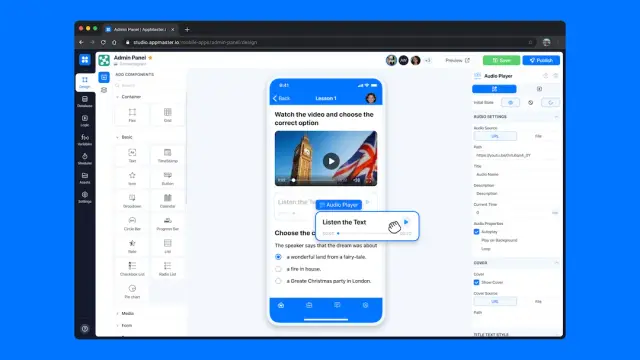How to Create Mobile Solutions for Laboratory Information Systems?
Explore the process of creating efficient and reliable mobile solutions for laboratory information systems. Learn about an effective alternative to traditional development.

Laboratory Information Systems (LIS) are specialized software solutions used in healthcare, research, and diagnostic labs to manage, track, and analyze medical testing data, patient specimens, and other laboratory workflows. An effective LIS streamlines operations, reduces manual data entry, and facilitates regulatory compliance, ensuring the accuracy and efficiency of laboratory processes.
In today's data-driven world, there is a growing need for modern, technology-driven tools to assist laboratory professionals in their day-to-day work. Mobile solutions for laboratory information systems now play a vital role in enabling technicians, researchers, and medical professionals to access, capture, and share real-time, on-demand information, streamlining laboratory operations while reducing the chance of errors.
Challenges Faced by Laboratories and the Need for Mobile Solutions
Laboratories face numerous challenges, including workflow complexities, regulatory compliance, human errors, and communication gaps. In the face of these challenges, efficient and accessible mobile solutions can significantly improve the functioning of laboratory operations. Let's take a closer look at the benefits of mobile solutions for laboratories:
- Improved sample tracking: Mobile apps can simplify the tracking of samples by utilizing barcode and QR code scanning features, facilitating sample storage management, and providing instant status updates on various tests.
- Instant result updates: Mobile solutions can provide real-time updates to medical professionals on the status of tests and results, reducing the waiting time and enabling faster decision-making.
- On-demand access to information: Mobile apps offer easy access to patient data, sample test results, and other related information, increasing efficiency and enabling lab professionals to make informed decisions wherever they are.
- Enhanced communication and collaboration: Mobile solutions facilitate team communication by providing instant notifications and enabling information sharing between laboratory staff, physicians, and other stakeholders.
- Reduced human errors: By automating several manual processes, mobile apps can help to minimize the risk of human error, improving the accuracy and efficiency of lab operations.
- Regulatory compliance: Mobile apps can support laboratories in maintaining compliance with various regulations by providing secure data storage and transmission and real-time access to information.
Key Features to Consider in Mobile Laboratory Applications
Designing and deploying a successful mobile solution for a laboratory information system requires careful consideration of several key features. The following are some essential features for mobile laboratory applications:
- User-friendly interface: A clean, well-designed user interface (UI) is crucial for any mobile app. Including easy-to-understand instructions, intuitive navigation, and clear reporting will significantly improve user experience.
- Role-based access control: The application should support role-based access control, ensuring that only authorized users can access specified areas of the application, maintaining data security and integrity.
- Barcode and QR code scanning: Mobile applications should support barcode and QR code scanning, enabling efficient sample tracking throughout the laboratory workflow.
- Sample and test tracking: The ability to track samples and tests at various processing stages, including sample collection, storage, testing, and disposal, is vital for maintaining accurate records and compliance with regulatory requirements.
- Secure data storage and transmission: Ensuring the mobile application adheres to industry-standard security practices for data storage and transmission is essential to protect sensitive patient and test data.
- Real-time notifications: Effective communication is critical in a laboratory setting. Mobile apps should provide real-time notifications and alerts for updates on test results, emergencies, and other important information.
- Analytics and reporting: A comprehensive mobile app should include advanced data analysis and reporting features, enabling laboratory professionals to monitor trends, identify issues, and track performance metrics.
- Integration with laboratory instruments: Mobile solutions must integrate smoothly with existing laboratory systems, including analytical instruments, robotic systems, and other specialized equipment. This ensures seamless data exchange and enhances efficiency.
Implementing these essential features in your mobile laboratory application can help ensure the app is efficient, reliable, and user-friendly, providing valuable support to laboratory professionals in their daily work.

Design and Architecture Considerations
A thorough understanding of the laboratory's requirements and anticipated use-case scenarios is essential when planning and designing mobile applications for laboratory information systems. The following design and architectural factors should be taken into consideration to ensure a reliable, functional, and user-friendly application:
Responsive and Intuitive User Interface
A well-designed user interface is a crucial factor in the usability and efficiency of your mobile application. Ensure that the interface is simple, clean, and provides easy navigation to the app's main features. Different user roles may require varying levels of access to information, so consider role-based access control and content filters that allow users to find relevant data quickly. Use appropriate icons, colors, and design patterns to intuitively guide users through the application.
Cross-Platform Compatibility
To accommodate a variety of devices and technologies, it's crucial to develop a cross-platform mobile application. Developing native applications for each platform (iOS, Android, etc.) can be time-consuming and costly. Consider using cross-platform frameworks or no-code platforms like AppMaster that allow for simultaneous development of applications for multiple platforms.
Offline Mode and Sync Capabilities
In laboratory environments, a stable internet connection may not always be available. Offering an offline mode for your mobile application ensures that users can continue working and inputting data even without access to the internet. Once reconnected, your app should sync the information back to the central database or LIS system. When designing this feature, data integrity and conflict resolution mechanisms must be considered to avoid discrepancies in data.
Data Security and Privacy
Keeping sensitive laboratory data secure is of the utmost importance. Ensure your mobile application adheres to industry-standard security protocols and encryption techniques when storing and transmitting data. Regular security audits can identify potential vulnerabilities and help maintain the highest level of data protection.
Scalability and Maintainability
An easy-to-scale and maintain application ensures that your LIS mobile solution can grow and evolve to accommodate new users, requirements, and technologies. Prioritize modular design principles that allow for adding or modifying features without impacting existing functionalities. Regular updates to the mobile application will maintain compatibility with evolving device systems and improve security, stability, and performance.
Integration with Laboratory Instruments
Seamless integration with laboratory instruments and existing LIS systems is vital to optimize workflow and minimize manual processes. The mobile solution should be designed to communicate and exchange data with laboratory equipment such as analyzers, centrifuges, and other devices. Depending on the manufacturer, different communication protocols and data formats may be involved, so your mobile application must include support for diverse connection mechanisms such as Bluetooth, Wi-Fi, and USB.
Also, ensure that your app supports industry-standard file formats (such as CSV, XML, JSON) and transmission protocols (like HL7), making data exchange as seamless and automated as possible. Libraries and tools for integrating with laboratory instruments and LIS systems reduce development time and simplify maintenance.
Leveraging No-Code Platforms like AppMaster for Rapid Mobile Development
No-code platforms like AppMaster enable rapid and cost-effective mobile app development without extensive coding knowledge. These platforms provide many benefits in creating laboratory mobile applications and offer several features that make them ideal for the task:
Drag-and-Drop Interface Builders
AppMaster provides a drag-and-drop interface builder, allowing developers to quickly design an application's user interface. This approach accelerates the development process and enables the creation of visually appealing applications with minimal coding required.

Pre-Built Templates and Components
A wide range of pre-built templates and components, such as forms, charts, and navigation elements, are available on the AppMaster platform. These can be customized to match the specific needs of a laboratory environment. Leveraging these pre-built components saves time and effort during the development process.
Easy Integration with Existing Systems and Devices
No-code platforms like AppMaster easily integrate with existing systems, such as LIS systems and laboratory instruments, through APIs and other communication protocols. The platform's flexible architecture allows developers to connect mobile applications with existing systems, ensuring seamless data exchange and boosting laboratory productivity.
Built-in Security and Compliance Features
AppMaster incorporates built-in security features, ensuring data privacy and protection throughout the development process. The ability to enforce role-based access control, encrypt sensitive data, and comply with industry standards and regulations ensures that laboratory mobile applications built using the AppMaster platform prioritize security and privacy.
Rapid Development, Testing, and Deployment
The use of a no-code platform dramatically decreases the time it takes to develop, test, and deploy mobile applications for laboratory information systems. AppMaster provides real applications with source code, making it possible to create scalable and easily maintainable applications. The platform's rapid deployment capabilities fetch you a fast time-to-market, ensuring that your mobile solution is in the hands of laboratory users as quickly as possible.
By utilizing no-code platforms like AppMaster, laboratories can enjoy the benefits of efficient and reliable mobile solutions without the daunting costs and complexities associated with traditional software development.
Benefits of using AppMaster for LIS Mobile Applications
Utilizing no-code platforms like AppMaster offers significant advantages in developing mobile solutions for laboratory information systems. Here are some key benefits that highlight the value of using AppMaster for creating LIS mobile applications:
Faster Development
AppMaster's technology speeds up app development by allowing citizen developers, medical professionals, and IT teams to create mobile applications without extensive coding knowledge. With drag-and-drop interfaces, pre-built templates, and visual business process designers, AppMaster enables rapid creation and deployment of laboratory mobile solutions, leading to significant time savings.
Cost Savings
One of the main challenges in developing mobile applications is the high cost of software development. By eliminating the need for hiring a team of experienced developers, AppMaster's no-code platform allows organizations to reduce development expenses. With lower costs and faster delivery times, AppMaster contributes to a more cost-efficient laboratory mobile application development process.
Elimination of Technical Debt
Technical debt arises when software solutions are developed and evolved through numerous adjustments, often leading to sub-optimal application architecture and hard-to-maintain code. AppMaster's unique approach to regenerating applications from scratch every time requirements change ensures that technical debt is eliminated, resulting in cleaner, more manageable applications with long-term stability and maintainability.
Scalability and Performance
AppMaster generates source code for mobile applications, ensuring a solid foundation that supports high-performance, scalable solutions. The resulting mobile application can effortlessly handle high-load and enterprise-level demands thanks to AppMaster's use of performance-optimized technologies such as Go, Vue3, and Jetpack Compose.
Customizable Solutions
With AppMaster, you can tailor your laboratory mobile solutions to fit your organization's unique needs and preferences. The platform offers various customization options, from user interface design to modifying business logic, ensuring that your mobile application precisely serves your laboratory information system requirements.
Conclusion
Developing efficient and reliable mobile solutions for laboratory information systems is crucial in today's technologically advanced healthcare sphere. Mobile applications empower medical professionals, researchers, and laboratory personnel, providing the necessary tools for efficient, compliant, and well-organized laboratory workflows.
By leveraging no-code platforms like AppMaster, organizations can streamline the mobile app development process, minimizing costs and making it accessible to a broader range of users. AppMaster's feature-rich platform facilitates rapid development, seamless integration with existing systems, and a powerful mobile solution that scales well with your organization's growth.
If you want to create a mobile solution for laboratory information systems, AppMaster provides a comprehensive, user-friendly, and efficient platform to develop, test, and deploy high-quality mobile applications tailored to your organization's unique needs.
FAQ
Laboratory Information Systems (LIS) are specialized software used in healthcare and research labs to manage, track, and analyze patient specimens, medical testing data, and other laboratory workflows. These systems streamline operations, improve efficiency, and facilitate regulatory compliance.
Mobile solutions for laboratories allow technicians, researchers, and medical professionals to capture, access and share real-time data seamlessly. They improve sample tracking, enable instant result updates, provide on-demand access to information, and enhance overall communication and collaboration within the lab.
Key features for mobile laboratory applications include user-friendly interfaces, role-based access control, barcode and QR code scanning, sample and test tracking, secure data storage and transmission, real-time notifications, analytics and reporting, and integration with laboratory instruments and existing laboratory information systems.
Design and architecture considerations for mobile laboratory applications include designing for various screen sizes, ensuring a responsive and intuitive user interface, maintaining data security and privacy, ensuring cross-platform compatibility, offline mode and sync capabilities, and considering scalability and maintainability during development.
No-code platforms like AppMaster enable rapid and cost-effective mobile app development without the need for extensive coding knowledge. They provide pre-built templates, drag-and-drop interface builders, and easy-to-use integration tools, making it faster and more efficient to develop, test and deploy laboratory mobile applications.
AppMaster's no-code platform generates real applications with source code, making it possible to create scalable solutions for enterprise applications like laboratory information systems. Using AppMaster's generated applications in combination with performance-optimized technologies ensures smooth and reliable performance even in high-load situations.
Yes, AppMaster allows easy integration with existing LIS and laboratory instruments via APIs and other communication technologies. The platform's flexible architecture and support for various data formats enable seamless connectivity with both existing systems and future upgrades.
AppMaster's no-code platform is suitable for a wide range of organizations, from small businesses to large enterprises. It's particularly useful for healthcare providers, research organizations, diagnostic laboratories, and any other entities requiring efficient laboratory information system management via mobile solutions.





